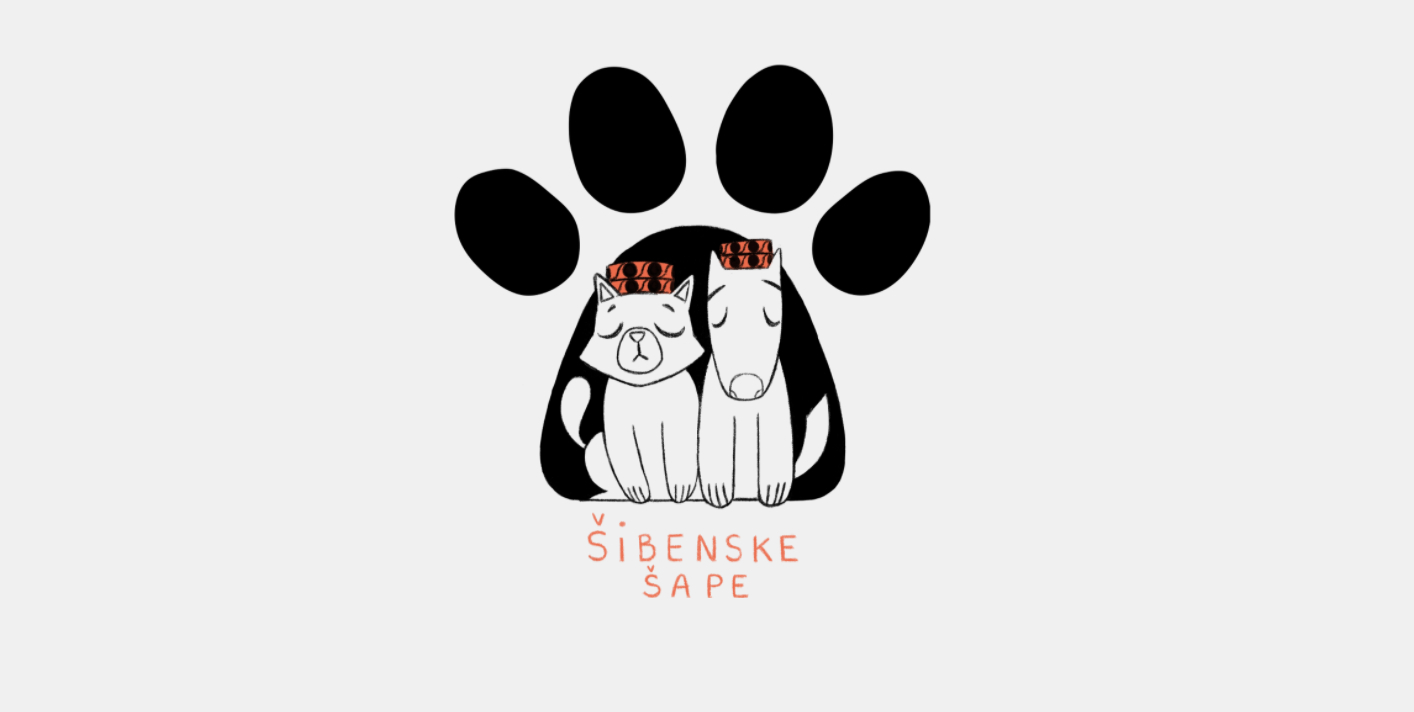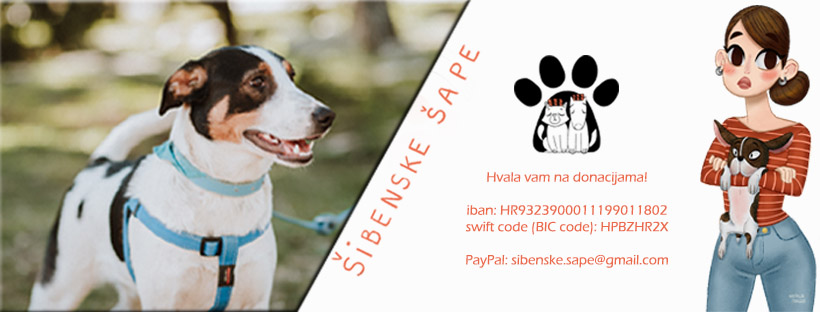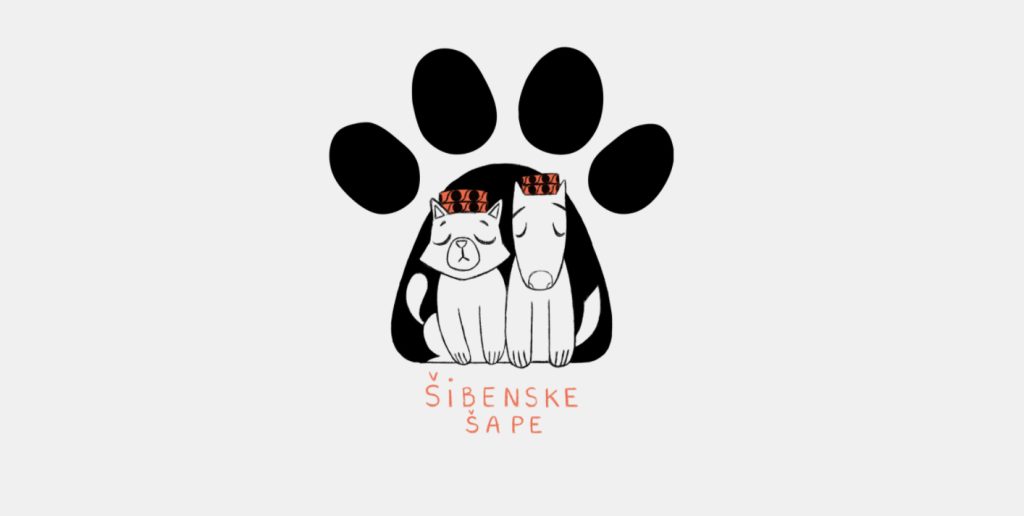
June 3, 2020 – What is the situation with animal shelters in Croatia in the corona era, and who is looking after the animals? A new TCN series meets the volunteers behind the animal shelters and associations around Croatia. Today, TCN meets Sibenske Sape from Sibenik.
There are hundreds of incredible shelters and associations in Croatia working tirelessly, with little to no support, to ensure no animal is left behind. In a new TCN series, we meet the people behind the animals.
Today, TCN meets Sibenske Sape from Sibenik.
First, tell us a bit about the history of your shelter/association.
The association Sibenske Sape (Šibenik Paws) was founded in 2018, although its members have been volunteering to help animals many years before that. We are devoted to helping lost and abandoned animals in Šibenik and the surrounding area. We don’t have a shelter, so we function entirely by placing the animals in foster homes. We make sure the animals get proper veterinary care and we advertise them until they find a forever home.
What is the success rate of getting animals to their new owners?
For some, it takes a short time, for some much longer, but all our animals find a forever home in the end. Usually, it takes a month or so in a foster home where the animal can forget about all the stress and trauma the street life has caused it. There, it learns to socialize, so it will be more easily adopted. Of course, some rare cases end up tragically, but that usually happens when the animal is found already severely injured and the vets cannot help it.
Do you connect animals with owners only in Croatia or abroad, too?
We use our Facebook page to connect people who have found an abandoned animal with the people offering to foster it until it is adopted. The foster homes are usually in Croatia, but some of our animals find their forever homes abroad, mostly in Slovenia and Germany. All the new owners pass a home check and our foreign colleagues are helping us organize that.
Do you receive any support from the city, county, or state? If so, how much/in what way?
We are not funded by the city and we depend entirely on donations and the free time of our volunteers. We do, however, get help from some cities in other forms. For example, Vodice is a city that pays for 70 free castrations/sterilizations for our animals at the local vet. We are hoping to make a similar deal with Šibenik soon as well.
What is the process of bringing animals to your shelter/association? Are there any obstacles/red tape in place for you as a shelter/association?
We are not allowed to rescue animals by simply picking them up from the street and taking them home. Every found animal has to be registered in the local shelter in Šibenik (As Eko). So the procedure is as follows: a person calls us that they found an animal, we then instruct them to call the municipal services and inform them of the animal. The municipal services then call the shelter to pick up the animal and if we have a foster home, we will intervene and take the animal into our care as soon as it’s checked for the microchip and vaccinated. We do this, especially, if the animal is very young or fragile, to avoid it coming into contact with the other animals in the shelter. The shelter life is tough and the more fragile animals can get pushed aside while feeding. The main obstacle we face is that the municipal services of some towns are refusing to cooperate, which is something they ought to do by law. Also, they cannot be reached during weekends.
Is the lack of sterilisations the biggest problem in Croatia? Is it really that difficult to get cats and dogs sterilised in Croatia?
It is not difficult at all to get them sterilized, however it seems to be difficult to get their owners to understand that they need to do it. The lack of sterilization is definitely a cause of the abandonment problem. Knowing how easily it could be solved makes it really painful for us to observe it. So we are trying hard to educate people to change their mentality slowly and to make them stop refusing to neuter/spay their animals.
How much does sterilisation usually cost? Do vets offer discounts for street cats or special circumstances?
We collaborate with a few vet stations and their prices differ, but let’s say a male cat can get castrated starting from 280 kn, a female cat from 400 kn, a male dog starting from 600 kn and a female one starting from around 800 kn, but the price increases with the size of the dog. We do get a certain discount for the animals we bring through the association.
How do we make this process easier for locals to get more of them involved in sterilising street cats?
In some of the vet stations, we have a special price for the cats and dogs we bring in for sterilization, so if somebody has a lower income and they want to sterilize their pet, we can help them get this discount. Also, if we manage to get some financial help from the city of Šibenik, we would love to organize a free neutering project for everyone who wishes to participate with their pets.
How many cats/dogs would you say your shelter/association gets sterilised per year?
Last year we got around 1500 animals sterilized, out of which around 1000 we sterilized in collaboration with an NGO from abroad and around 500 ourselves.
Poisoning street cats is another issue in the area. Is this considered a crime in Croatia? Where should someone report this should they witness it? Are there fines/punishments in place?
It is definitely a crime. Unfortunately, it’s a crime that seldom gets punished. It should be reported to the police. The one reporting the crime has to be persistent when calling because often the police itself doesn’t take this very seriously. We have never heard of someone actually getting a fine or punishment for this crime.
What about the treatment of dogs?
Many dogs in Croatia are being used as hunting dogs. Some of them are treated very badly – they are locked in small boxes all day or chained up in the sun with water bowls already growing algae on the bottom. Keeping dogs chained up all day is also punishable by law, but the perpetrators often get away with it, saying to the veterinary inspection that they do, in fact, walk the dogs, just early in the morning when nobody can witness it. We urge everyone to report the owners who mistreat their dogs. It can be done anonymously – only the inspection and the police will know their personal information and they will not share it with the owner, or anyone else.
What are the best ways for the local community to get involved in helping your shelter/association?
We are in desperate need of foster homes, so anyone who can temporarily take care of an animal will be of great help to us. Also, any donation will be greatly appreciated.
Donations can be made via bank transfer or via Paypal.
Name: Šibenske šape
Bank name: Hrvatska poštanska banka (HPB)
iban: HR9323900011199011802
BIC (swift code): HPBZHR2X
Paypal: sibenske.sape@gmail.com

Can you explain the process of fostering animals with your shelter/association?
The ”foster parents” can choose which cat or dog they want to foster and we will provide them with the food and everything else they need for taking care of the animal. We need to agree in advance how long the animal can stay in their foster home, ideally until adoption. A simple contract will be signed, explaining each side’s obligations. Fostering is an ideal way of helping animals for people who love them but cannot make a long term commitment at the given moment.
How can the local community get involved in helping your shelter/association? What about people from abroad get involved, apart from sending donations?
There are many ways a local community can get involved. We need all kinds of help – photographers can get involved by taking professional photos of our protégés, we often need transport of our cats or dogs to their new homes or simply to the vet, and as previously said we need people who are willing to foster the animals.
People from abroad can, of course, donate, but also they can help us by sharing our posts online so we could reach a wider audience.
Is there a way for Croatia to utilise their place in tourism to help animals in Croatia? Whether it is connecting tourists with animals for adoption or organizing volunteer events at shelters?
We believe tourism can be of great help. Many people find out about us while travelling through Croatia and later they adopt an animal or find another way to help us. Tourists are often sensitive about seeing street animals, so they help us raise awareness with the local community.
You can learn more about Sibenske Sape HERE.
Do you have an animal shelter or association in Croatia and want to share your story? Get in touch at daniela@total-croatia-news.com.
To read more about lifestyle in Croatia, follow TCN’s dedicated page.








